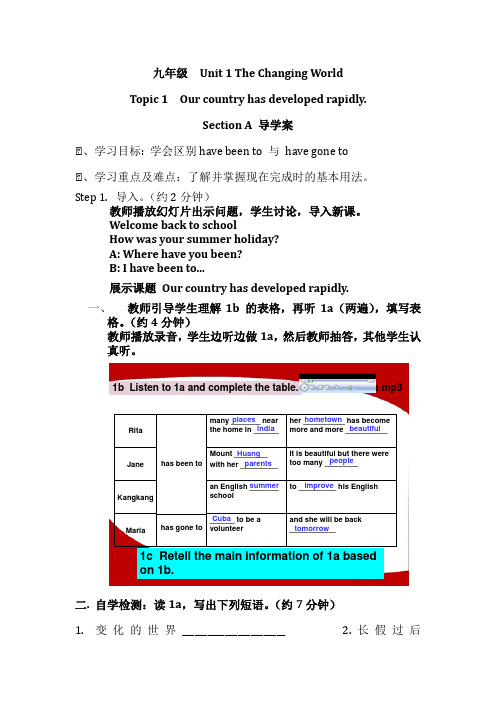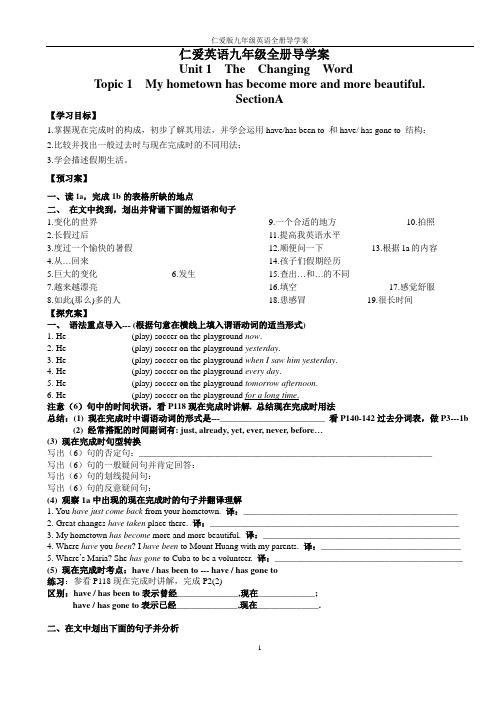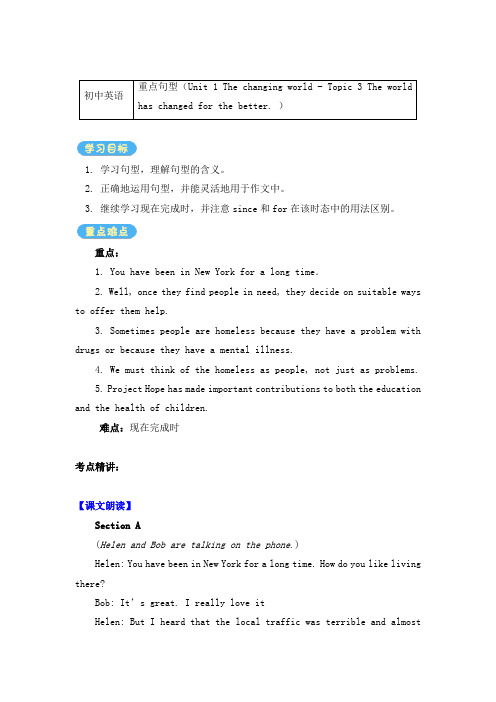2015-仁爱版九年级英语全册导学案-Unit-1
仁爱英语九年级上Unit 1 Topic1--3同步教学导学案

九年级 Unit 1 The Changing WorldTopic 1 Our country has developed rapidly.Section A 导学案Ⅰ、学习目标: 学会区别have been to 与 have gone toⅠ、学习重点及难点:了解并掌握现在完成时的基本用法。
Step 1. 导入。
(约2分钟)教师播放幻灯片出示问题,学生讨论,导入新课。
Welcome back to schoolHow was your summer holiday?A: Where have you been?B: I have been to...展示课题 Our country has developed rapidly.一、 教师引导学生理解1b 的表格,再听1a (两遍),填写表格。
(约4分钟)教师播放录音,学生边听边做1a ,然后教师抽答,其他学生认真听。
1b Listen to 1a and complete the table.has gone to to _________ his English it is beautiful but there were too many ________her __________ has become more and more __________Maria Kangkang Jane Rita has been to and she will be back _________________ to be avolunteer an English _______schoolMount ________ with her _________many _______ nearthe home in ______places India hometown beautiful Huangparentspeople summer improve Cuba tomorrow 1c Retell the main information of 1a basedon 1b.P1 1a mp3二. 自学检测:读1a ,写出下列短语。
仁爱版九年级英语全册导学案

仁爱版九年级英语全册导学案1仁爱英语九年级全册导学案Unit 1 The Changing WordTopic 1 My hometown has become more and more beautiful.SectionA【学习目标】1.掌握现在完成时的构成,初步了解其用法,并学会运用have/has been to 和have/ has gone to 结构:2.比较并找出一般过去时与现在完成时的不同用法;3.学会描述假期生活。
【预习案】一、读1a ,完成1b 的表格所缺的地点二、 在文中找到,划出并背诵下面的短语和句子1.变化的世界________________________________2.长假过后__________________________________3.度过一个愉快的暑假________________________4.从…回来__________________________________5.巨大的变化_________________6.发生____________7.越来越漂亮________________________________8.如此(那么)多的人___________________________9.一个合适的地方________________10.拍照________11.提高我英语水平__________________________12.顺便问一下___________13.根据1a 的内容________14.孩子们假期经历__________________________15.查出…和…的不同__________________________16.填空_____________________17.感觉舒服________18.患感冒______________19.很长时间_____________【探究案】一、 语法重点导入--- (根据句意在横线上填入谓语动词的适当形式)1. He ______________ (play) soccer on the playground now .2. He ______________ (play) soccer on the playground yesterday .3. He ______________ (play) soccer on the playground when I saw him yesterday .4. He ______________ (play) soccer on the playground every day .5. He ______________ (play) soccer on the playground tomorrow afternoon .6. He ______________ (play) soccer on the playground for a long time .注意(6)句中的时间状语,看P118现在完成时讲解, 总结现在完成时用法总结:(1) 现在完成时中谓语动词的形式是---________________________ 看P140-142过去分词表,做P3---1b(2) 经常搭配的时间副词有: just, already, yet, ever, never, before …(3) 现在完成时句型转换写出(6)句的否定句:___________________________________________________________________写出(6)句的一般疑问句并肯定回答:_____________________________________________________写出(6)句的划线提问句:_______________________________________________________________写出(6)句的反意疑问句:_______________________(4) 观察1a 中出现的现在完成时的句子并翻译理解1. You have just come back from your hometown. 译:_________________________________________________2. Great changes have taken place there. 译:_________________________________________________________3. My hometown has become more and more beautiful. 译:_____________________________________________4. Where have you been ? I have been to Mount Huang with my parents. 译:________________________________5. Where ’s Maria? She has gone to Cuba to be a volunteer. 译:___________________________________________(5) 现在完成时考点:have / has been to --- have / has gone to练习:参看P118现在完成时讲解,完成P2(2)区别:have / has been to 表示曾经______________,现在_____________;have / has gone to 表示已经______________,现在______________.二、在文中划出下面的句子并分析1. Great changes have taken place there. 注意:taken是take的______________形式点拨:change有名词/动词两种词性,名词词意是_________/__________等; 动词词意是_________ take place --- 发生、举办,指非偶然性事件的“发生”,即这种事件的发生一定有某种原因或事先的安排区别:happen --- 发生、碰巧,一般用于偶然或突发性事件注意:take the place of…--- 取代某人的位置练习:a. Jason ___________________________ Miss Li to teach us French next term.b. The Olympic Games of 2008 ________________________ successfully in Beijing.c. What ___________________________ to you yesterday?2. But there were so many people that I couldn’t find a proper place to take photos.思考:so…that…意思是__________,引导_______状语从句区别:so that…意思是_______,引导_______状语从句练习:a.为了拍照,他爬得很高。
九年级英语上册全一册导学案(打包54套)(新版)仁爱版

九年级英语上册全⼀册导学案(打包54套)(新版)仁爱版The Changing World教师寄语:A waste of their time is slow suicide, wasting people's time is the murder.( 浪费⾃⼰的时间是慢性⾃杀,浪费别⼈的时间是谋财害命。
)Class________ Grade9 Group_________ Name_____________课型:预习+展⽰课Title: Unit 1 The Changing world (正在变化着的世界)Topic 1:Our country has developed rapidly. (我们的国家发展迅速。
)Section: B 1a-1c (P3) 第⼀课时Learning steps (学习过程):⼀、抽测反馈(Check before class)(5’)(我会做)1.⽤括号内单词的正确形式填空。
1) Great changes ________________(take) place in Rita’s hometown.2)Jane ________________( be) to Mount Huang with her parents.3) Kangkang ________________( be ) to an English summer school to improve hisEnglish.4)There __________(go ) the bell.2.根据汉语意思完成句⼦,每空⼀词。
1)天⽓很糟糕,以⾄于我不想出去。
The weather is ______bad ______I don’t want to go out.2)顺便说⼀句,今晚到我家喝⼀杯怎么样?________ ________ ________ , why not have a drink at my home this evening?3)他去伦敦了。
英语九年级上册 重点句型(Unit 1 The changing world - Topic 3 . )-导学案-仁爱版

初中英语重点句型(Unit 1 The changing world - Topic 3 The world has changed for the better. )1. 学习句型,理解句型的含义。
2. 正确地运用句型,并能灵活地用于作文中。
3. 继续学习现在完成时,并注意since和for在该时态中的用法区别。
重点:1. You have been in New York for a long time.2. Well, once they find people in need, they decide on suitable ways to offer them help.3. Sometimes people are homeless because they have a problem with drugs or because they have a mental illness.4. We must think of the homeless as people, not just as problems.5. Project Hope has made important contributions to both the education and the health of children.难点:现在完成时考点精讲:【课文朗读】Section A(Helen and Bob are talking on the phone.)Helen: You have been in New York for a long time. How do you like living there?Bob: It’s great. I really love itHelen: But I heard that the local traffic was terrible and almosteveryone drove too fast.Bob: Oh, you will get used to it very soon if you come.Helen: I also heard the streets were dirty.Bob: They used to be, but the city has improved a lot since I came here a few years ago.Helen: Isn’t it dangerous to live there?Bob: Well, it was in the past, but it’s quite safe now. As a matter of fact, it’s a wonderful place to live. Near our block, there are beautiful parks, good schools, famous museums and excellent restaurants. And you can go to plays, concerts and operas every day if you like. You must come for a visit. Then you can see New York yourself.Section BMaria: What are you reading, Jane?Jane: I’m reading a newspaper from Canada. Martin showed me an interesting article. It is about a program that helps homeless people.Maria: Are there homeless people in Canada?Jane: Oh, yes. Many countries have homeless people. The article says one city has a wonderful program. Since it started, it has helped hundreds of people return to work and live a normal life.Maria: That sounds great! How do they manage it?Jane: Well, once they find people in need, they decide on suitable ways to offer them help.Maria: Can the homeless people get enough food, homes and medical treatment?Jane: Yes. And it’s not only that. The program also provides them with job training so that they can find jobs again.Maria: I think it is important for these people to feel good about themselves.Jane: You are right. The world has changed for the better.Section COne of the most basic human needs is a home. A home is a safe place. While most people around the world value their homes, there are many people in every country who are homeless.Some people are homeless for a short period of time because they are moving from one place to another, and other people are not able to find a home. They must live on the streets or in a shelter.There are many causes of homelessness. Sometimes people can not keep a home because they do not earn enough money, or because they do not have a job. Sometimes people are homeless because they have a problem with drugs or because they have a mental illness. No one is ever homeless on purpose.Whatever the cause of homelessness is, the effects are the same. Homeless people must work very hard to live. They can not raise their children. Sometimes they must steal food just to eat. The government in every country has worked for many years to support the homeless but more needs to be done. We must think of the homeless as people, not just as problems.【句型精析】1. You have been in New York for a long time.你在纽约待了很长时间。
Unit 1 Topic 2 sectionA 教案仁爱版九年级英语上册

九年级上册Unit 1 Topic 2 The population in developing countries is growing faster.Section A【教学构思】一、教材分析:本课属于课标话题人与社会——“世界与环境(The world and the environment)”中人口(Population)项目,涉及课标功能意念表“态度(Attitude)”中同意(Agreement)项目,主要通过Maria和Michael电话对话讨论关于购物中心拥挤状况。
主要教学活动为1a和2,通过Maria和Michael的电话对话,讨论关于购物中心拥挤状况,学习与ever,never,just,yet,already连用的现在完成时以及So do I句式表达同意别人观点的用法。
在2听力活动中,进一步训练与ever,never等词连用的现在完成时的用法。
教师通过听说活动,训练学生的听和说的能力,设计语言实践活动让学生能在“用中学”。
二、设计说明:根据学情和本课的语法及话题,本节课的教学设计将听与说相结合,以1a为载体,立足话题,聚焦语法,通过听说练习内化知识;在语言生成阶段,循序渐进,帮助学生学以致用,并通过同伴合作完成学习任务。
本课在重、难点突破的方法上有所创新,教师通过听说活动在“学中用”,接着通过小组活动“用中学”,激发学生学习兴趣,引导学生表达自己的观点和看法,积极参与课堂,发展学生思维品质和团队协作意识。
【教学目标】1. 通过听力活动和朗读对话,掌握对话大意和细节,培养“听”与“读”的语言能力;2. 在对话和语篇中学习与ever,never,just,yet,already连用的现在完成时,准确理解ever,never,just,yet,already的意义并用于表达;3. 通过paraphrase的形式练习,初步进行语言输出,提高综合运用语言的能力;4. 通过小组活动,发展思维品质、自主学习能力和团队协作意识。
仁爱版九年级上册英语-Unit1:Topic3单词汇总+知识梳理

仁爱九上-Unit1 Topic3知识梳理重点短语:1.on the phone 通过电话,在电话上2.have/has been in…某人在某地待了长时间3.get/be used to(doing) sth. 习惯于(做)某事ed to do sth. 过去常常做某事5.as a matter of fact/in fact事实上6.show sb. sth.=show sth. to sb.给某人展示某物7.homeless people 无家可归的人8.live a normal/happy/hard life过着一种正常的/幸福的/艰苦的生活9.in need 在困难时,在贫困之中10.decide to dosth.决定做某事decide on sth. 决定某事make a decision 做决定11.offer sb.sth.=offer sth. to sb.给某人提供某物12.medical treatment 医疗救助13.provide sb.with sth.=provide sth. for sb.为某人提供某物14.feel good about oneself 自我感觉良好15.change for the better 变得更好16.get/be in trouble 陷入困境17.pick up 捡起,(用车)接(人或物)18.help sb. out 帮助某人摆脱困境19.the cause of 导致……的原因the result of ……的结果the reason for ……的原因20.on purpose 故意21.have a problem with…有……问题22.think of… as…把……视为……23.raise one’s children抚养孩子24.afford sth. for sb. 为某人支付/担负某物 afford to do sth. 担负得起做某事25.make contributions to(doing)sth.在(做)某事方面做出贡献26.as a result 结果27.without the help of…没有……的帮助lions of 数百万29.according to 据……所说,按……所报道30.plenty of 大量的31.短暂性动词----延续性动词:die---be deadleave---be away (from)come/become---bejoin---be in/be a member ofbuy---haveborrow---keepopen---be openclose---be closedbegin/start---be onmarry---be marriedfall ill---be ill词形转换:1.visit v./n.参观,访问,游览visitor n.参观者,来访者2.chemical adj.化工的,化学的chemistry n.化学,化学物质3.homeless adj.无家的homelessness n.无家可归4.treat v.对待,治疗treatment n.疗法,治疗5.basic adj.基本的,基础的base n.基础6.important adj.重要的importance n.重要性,重要重点句型:1.You have been in New York for a long time.你已经在纽约待了很长时间了。
仁爱科普版 英语 九年级上册 Unit 1 Topic 1 Section A
Jane
Mount _H_u_a_n_g___ with her p_a_r_e_n_t_s___ has been to
Kangkang
an English s_u_m__m__e_r school
it is beautiful but there were too many _p_e_o_p_le___
A: Where has Jane gone? I can’t find her.
B: She has gone to the library.
A: Where have Maria and her mother gone? I can’t find them.
B: They have gone to the shop.
Find the sentences with Present Perfect Tense.
You have just come back from your hometown. Great changes have taken place there and my hometown has become more and more beautiful. I have been to Mount Huang with my parents. Oh, she has gone to the library.
现在完成时: have/has + 过去分词
Act it out 三人一组,进行表演
(After a long holiday, Kangkang is happy to see his friends.)
Look, listen and say.
Key phrases and expressions:
2015年-2016最新仁爱版九年级(上册)英语全册教学案
Unit 1 The Changing WorldTopic 1 Our country has developed rapidlySection AⅠ. Material analysis本课是九年级第一单元第一话题的第一课时。
本课内容丰富,主活动为1a和3。
1a部分通过“谈论假期经历”初步感知现在完成时“have/has been to 和have/has gone to” 的用法。
1b引导学生运用抓关键字词完成表格的方法,培养学生的听力技能。
1c 则是培养学生运用关键词复述课文的能力。
2a通过创设新的语境,在听的过程中进一步体会“have /has been to 和have/has gone to”。
然后在2b中让学生通过小组合作的方式总结它们的区别。
通过前几个步骤的学习,学生完全可以口头运用“have/has been to 和have /has gone to”来进行3的对话操练。
这样,在听、说、读、写各个方面都对新语法进行了全方位地复现和操练,有利于巩固新知识。
通过谈论假期生活,既可以相互增长见识又可以增进同学间的友谊。
Ⅱ.Teaching aims1.Knowledge aims:掌握本课的重点词汇和短语,初步学习现在完成时。
2.Skill aims:培养学生的听力能力。
培养学生的口语表达能力。
能通过整合对话内容,提升综合语言运用能力,为语言输出做好准备。
3.Emotional aims: (optional)引导学生了解不同的假期生活,热爱生活,增进友谊。
4.Culture awareness: (optional)通过了解不同的假期生活,引导学生关注不同的生活方式有不同的人生意义,培养他们热学习好帮手爱生活的品质。
Ⅲ. The key points and difficult points1. Key points:Words and phrases: bell, take place, volunteer, have/has been to…, have/has gone to…, so…that…, by the way, be happy to do…Sentences: There goes the bell. /It must be fun.Grammar: Present Perfect (have/has been to和have/has gone to的用法)2. Difficult points:能通过听、说和读的方式感知并掌握have/has done的用法。
英语九年级上册 口语与听力(Unit 1 The changing world - Topic 3 . )-导学案-仁爱版
初中英语口语与听力(Unit 1 The changing world - Topic 3 The world has changed for the better. )1. 能识别出句子中单词的重音、弱读、连读以及停顿。
2. 能借助语境克服生词障碍、理解听力大意。
重点:能针对所听语段的内容记录简单信息。
难点:能借助语境克服生词障碍、理解所听内容。
考点精讲:【听力课堂】听下面一段对话,回答第1至第2两个小题。
1. What does Mr. Wu usually do on Friday night?A. Watches movies.B. Watches TV.C. Surfs the Internet.2. What shows does Mr. Wu love best?A. Game shows.B. Talent shows.C. Talk shows.听力原文W: What do you usually do on Friday night, Mr. Wu?M: I usually go to the cinema and sometimes I watch TV at home.W: What kind of show do you usually watch? What do you think of game shows?M: I am not fond of them. I like talk shows best.W: I don’t think your wife loves talk shows.M: No, she doesn’t. She loves talent shows. So I watch talk shows with my son.答案:A C思路分析:1. 根据听力材料内容“我通常去看电影,有时在家看电视”可知,吴先生通常看电影,故选A。
2. 根据听力材料内容“因此我和儿子一起看谈话节目”可知,吴先生喜欢谈话节目,故选C。
仁爱版初中英语九年级下全册教案
仁爱版初中英语九年级下全册教案一、教学内容1. Unit 1 Life is full of challenges.2. Unit 2 What's the matter?3. Unit 3 Could you please clean your room?4. Unit 4 I must tell you.5. Unit 5 It's raining!6. Unit 6 How's your school life?二、教学目标1. 学生能够掌握本册书的所有知识点,包括单词、短语、语法和功能用语。
2. 学生能够运用所学知识进行日常交流,提高英语口语能力。
3. 学生能够通过阅读和写作,提高英语综合素质。
三、教学难点与重点重点:单词、短语、语法和功能用语的掌握。
难点:情态动词的用法和被动语态的运用。
四、教具与学具准备1. 教具:PPT、黑板、粉笔、录音机、磁带。
2. 学具:课本、练习册、笔记本、录音机、磁带。
五、教学过程1. 热身(5分钟)通过播放英语歌曲,引导学生跟着唱,活跃课堂气氛。
2. 导入(10分钟)利用PPT展示本课的主题,引导学生谈论相关话题,自然引入新课。
3. 新课呈现(20分钟)利用PPT展示新课的单词、短语、语法和功能用语,引导学生跟读、模仿。
4. 课堂练习(15分钟)设计一些练习题,让学生分组进行练习,巩固所学知识。
5. 小组活动(10分钟)设计一个小对话,让学生分组进行角色扮演,锻炼口语表达能力。
7. 布置作业(5分钟)设计一些作业题,让学生课后巩固所学知识。
六、板书设计1. 单词:用粉笔在黑板上写出本课的重点单词,方便学生随时查阅。
2. 短语:用粉笔在黑板上写出本课的重点短语,方便学生随时查阅。
3. 语法:用粉笔在黑板上写出本课的重点语法知识,方便学生随时查阅。
七、作业设计1. 题目:用英语写一篇关于学校生活的作文。
2. 题目:完成课后练习册的相关练习。
- 1、下载文档前请自行甄别文档内容的完整性,平台不提供额外的编辑、内容补充、找答案等附加服务。
- 2、"仅部分预览"的文档,不可在线预览部分如存在完整性等问题,可反馈申请退款(可完整预览的文档不适用该条件!)。
- 3、如文档侵犯您的权益,请联系客服反馈,我们会尽快为您处理(人工客服工作时间:9:00-18:30)。
2015-仁爱版九年级英语全册导学案-Unit-1仁爱英语九年级上册导学案Unit 1 The Changing WordTopic 1 Our country has developed rapidlySection A【学习目标】1.掌握现在完成时的构成,初步了解其用法,并学会运用have/has been to 和have/ has gone to 结构:2.比较并找出一般过去时与现在完成时的不同用法;3.学会描述假期生活。
【预习案】一、读1a,完成1b的表格所缺的地点二、在文中找到,划出并背诵下面的短语和句子1.变化的世界________________________________2.长假过后__________________________________3.度过一个愉快的暑假________________________4.从…回来__________________________________5.巨大的变化_________________6.发生____________7.越来越漂亮________________________________8.如此(那么)多的人___________________________9.一个的地方________________10.拍照________11.提高我的英语水平__________________________12.顺便问一下___________【探究案】一、语法重点导入--- (根据句意在横线上填入谓语动词的适当形式)1. He ______________ (play) soccer on the playground now.2. He ______________ (play) soccer on the playground yesterday.3. He ______________ (play) soccer on the playground when I saw him yesterday.4. He ______________ (play) soccer on the playground every day.5. He ______________ (play) soccer on the playground tomorrow afternoon.6. He ______________ (play) soccer on the playground for a long time.总结:(1) 现在完成时中谓语动词的形式是---________________________(2) 经常搭配的时间副词有: just, already, yet, ever, never, before…(3) 现在完成时句型转换写出(6)句的否定句:___________________________________________________________________写出(6)句的一般疑问句并肯定回答:_____________________________________________________写出(6)句的划线提问句:_______________________________________________________________写出(6)句的反意疑问句:_______________________(4) 观察1a中出现的现在完成时的句子并翻译理解1. You have just come back from your hometown.译:_________________________________________________2. Great changes have taken place there.译:_________________________________________________________3. My hometown has become more and more beautiful.译:_____________________________________________4. Where have you been? I have been to Mount Huang with my parents.译:________________________________5. Where’s Maria? She has gone to Cuba to be a volunteer.译:___________________________________________ (5) 现在完成时考点:have / has been to --- have / has gone to区别:have / has been to表示曾经______________,现在_____________;have / has gone to表示已经______________,现在______________.二、在文中划出下面的句子并分析1. Great changes have taken place there. 注意:taken是take的______________形式点拨:change有名词/动词两种词性,名词词意是_________/__________等; 动词词意是_________ take place --- 发生、举办,指非偶然性事件的“发生”,即这种事件的发生一定有某种原因或事先的安排区别:happen --- 发生、碰巧,一般用于偶然或突发性事件sth. happen to sb. 某人发生了某事注意:take the place of…--- 取代某人的位置练习:a. Jason ___________________________ Miss Li to teach us French next term.b. The Olympic Games of 2008 ________________________ successfully in Beijing.c. What ___________________________ to you yesterday?2. But there were so many people that I couldn’t find a good place to take photos.思考:so…that…意思是__________,引导_______状语从句区别:so that…意思是_______,引导_______状语从句3. There goes the bell.译:_____________________________ 思考:这是个there提前引起的__________句回忆:副词here, there 提前到句首要引起主谓倒装,但是当主语为人称代词时不倒装。
练习:a. Here comes the No.31 Bus. 译:________________________b. There they are. 译:___________________c. Jim跑过来了。
译:___________________________d.他跑过来了。
译:____________________________SectionB【学习目标】1.继续学习现在完成时的用法;2.比较新旧社会青少年的生活状况,启发同学们珍惜新社会的幸福生活。
【预习案】一、在文中找到并划出下面的短语1.参加…_______________________ 8.一段美好的经历_______________________________2.志愿者活动________________________________ 9.从…学到很多_________________________________3.在暑假期间________________________________ 10.没有时间做…_________________________________4.残疾儿童__________________________________ 11.跳绳______________12.网上聊天_______________5.为…打扫房间______________________________ 13暑假补课_________________________6.喂他们吃饭____________7.为他们做饭___________ 14.做农活___________________________【探究案】一、在文中划出下面的句子并分析1. You took part in some volunteer activities during the summer holidays, did n’t you?点拨:take part in “参加….”,后常接某项活动。
练习:He ______________________ the sports meeting yesterday. 他昨天参加了运动会。
2. What a wonderful experience! 译:________________________ 同义句:How _______________________感叹句转换练习:(根据P5---1a的图下提示词用what和how写感叹句)a. 多么狭窄的公路啊!What______________________________! / How___________________________________!b. 多么艰苦的生活条件啊!What___________________________! / How__________________________________!注意:如果对行为动词感叹,只能用How引导!c. 看!他跑得是多么快啊!_________________________________!3. Though I had no time to travel, I still felt very happy.译:_______________________________________________思考:你能将上句改为用but的形式吗?______________________________________________________________ though和__________引导______________从句,语气较弱,不与__________连用;___________________和___________________也用于引导______________从句,带有强调的意味,语气较强。
